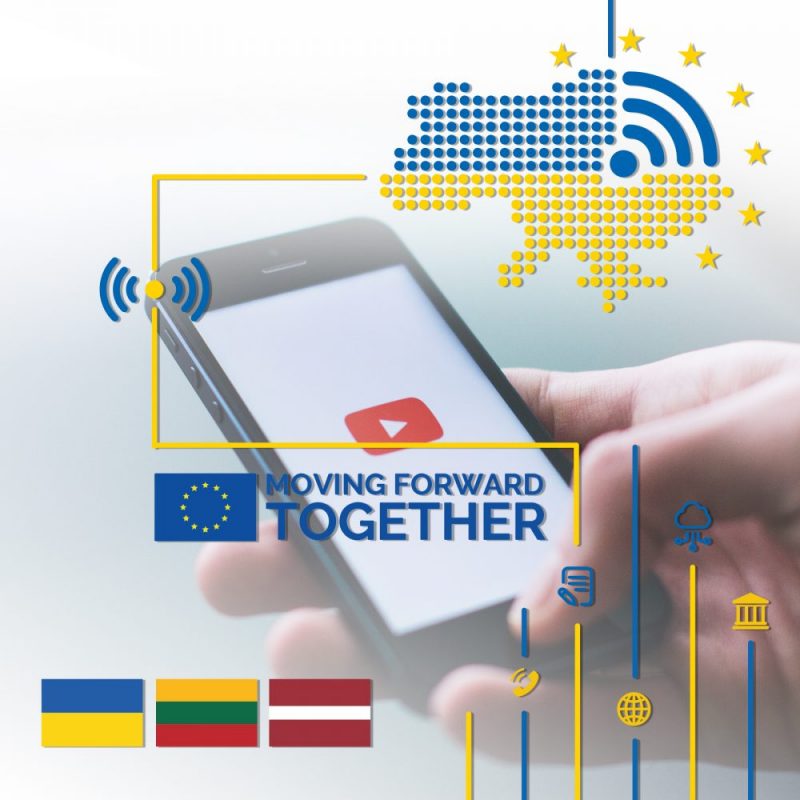
On 18-19 November 2020 RRT experts organised workshops for the representatives of the providers of Ukrainian electronic communications services, National Commission for the State Regulation of Communications and Informatization of Ukraine, ministries and other state institutions on the key aspects of the quality of end-users and public information service. These workshops were organised under the framework of the Twinning Project of the European Union “Strengthening the Regulatory Capacity of the National Commission for the State Regulation of Communications and Informatization in the Areas of Market Access and Quality of Service Monitoring System”.
RRT experts, having assessed the specifics of electronic communications in Ukraine, prepared guidelines on how to apply the EU practice in the field of service quality assurance in this country more effectively. During the workshop, the proposed guidelines were presented, the relevant implementation practice in Lithuania was shared, and discussions were held in order to assess in details the possibilities of applying the EU regulatory practice in Ukraine.
“Comprehensive and clear information to consumers about the features of the service, its quality and the terms of the provision contract enables the consumer to choose the most suitable service not only on the basis of price. We have therefore sought to emphasize to Ukrainian market participants and colleagues that, in a competitive electronic communications service environment, the service provider should have an interest in providing as much information as possible to its customers and that the information published by regulators on quality of service, and tools to assess the quality of service they provide allows the user to receive independent, objective, comparable information about the services of interest”, says Virgilijus Stundžia, Director of the Infrastructure and Device Control Department of RRT, Head of Consumer Information on the First Component of this Twinning Project.
During the workshops RRT experts presented:
- The experience of RRT in informing consumers about the quality of services. RRT uses many tools for electronic communications services: it requires service providers to include information on service quality in contracts and make it public, collects and publishes data on service quality received from service providers. Tools developed by RRT provide information on the quality of services in the operators’ networks, monitors quality, and pays great attention to informing and educating consumers through various channels.
- The role of the regulator and market participants in communicating with consumers. The best practice of RRT cooperation with service providers was shared in the context of communication, practical examples were provided on informing and educating consumers on service quality issues, RRT communication during the COVID-19 pandemic was reviewed, and attention was also focused on the currently relevant 5G information.
- Consumer protection and problem-solving opportunities. The regulation of rights and legitimate interests and compliance with the requirements of contractual documents are particularly important for the full protection of consumer rights. The participants of the workshop were informed on the importance of paying attention to consumer education, as well as the behaviour of electronic communications service providers in order to focus on consumer benefits, cooperation between service providers and the regulator.
- Internet quality assessment tool for users Internet access speed measurement system matuok.lt, which allows users to determine Internet speed in real time. RRT’s participation in the BEREC NN Tool project, which aims to create a common Internet access speed measurement system used in European countries, was reviewed and the intention to adapt this system and make it available to Internet users in Lithuania was presented.
- The importance of information on quality of service (QoS) of Internet access via fixed communication technologies and coverage of fixed networks. Based on practical examples, it was emphasized that collection and publication of such data from service providers benefits not only consumers or the national regulator, but also operators, in order to ensure the best possible quality of their services or to avoid over-regulation.
- The experience of RRT in publishing mobile network coverage. The possibility for a consumer to check the offered coverage is significant in assessing the quality of services provided by operators. A new tool, LTE high-speed maps, introduced by RRT this year, was presented. Theoretical calculation-based speed maps allow consumers to compare the expected data download speeds in the networks of mobile radio operators. The practice of RRT in developing this service quality assessment tool was presented, the possible difficulties and their solutions were reviewed, and recommendations on how to make the fast map as informative as possible for service users were provided. RRT shared the recommendations prepared for the Ukrainian regulator regarding the methodology of theoretical calculations of mobile network coverage and the publication of the obtained results.
About the project:
Since September 2019, RRT together with Latvian Public Utilites Commission is executing the Twinning Project of the European Union in Ukraine “Strengthening the Regulatory Capacity of the National Commission for the State Regulation of Communications and Informatization in the Areas of Market Access and Quality of Service Monitoring System”. The purpose of this project is to enhance and improve the abilities of the National Commission for the State Regulation of Communications and Informatization of Ukraine in the fields of service quality monitoring of electronic communications, access to electronic communications networks and connection of networks.
Project value: 1.3 million of EUR.
Project duration: September 2019 – June 2021.
Project number: UA 18 ENI TE 01 19.
Updated on 2020-11-30